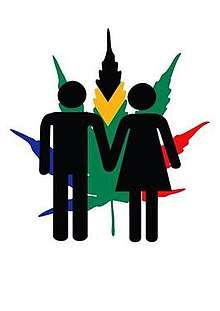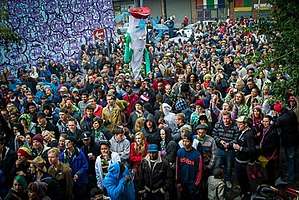Dagga Couple
The Dagga Couple or DC is a pro-cannabis lobbyist organisation from South Africa founded by Julian Stobbs and Myrtle Clarke after the two were arrested for the possession and dealing in the substance in 2010. Rather than plead guilty, the couple decided instead to sue seven sectors of government that maintained and enforced the policy of cannabis prohibition in the country resulting in what has been described locally as the Trial of the Plant in 2017.[2]
 The Dagga Couple logo | |
| Motto | "I am not a criminal"[1] |
|---|---|
| Founder(s) | Julian Stobbs, Myrtle Clark |
| Established | 2010 |
| Focus | Legalization or decriminalization of cannabis in South Africa |
| Location | |
| Website | daggacouple |
History and arrest
Julian Stobbs, a retired Royal Navy air traffic controller and art director in the television and film industry and Kathleen (Myrtle) Clarke, a freelance art director and former school teacher were arrested after police, acting on a tip-off, raided their home in August 2010. Having more than 115 grams of cannabis (South African law dictates that anything above 115 grams is considered dealing), they were charged with possession, the intent to sell and faced a lengthy jail time if convicted. They were granted bail and subsequently released.
...we had a very heavy handed visit from the South African Police Service who, acting on a tip off, raided our property in search of a 'drug lab'. What they found was a quiet middle aged couple in their pyjamas and a quantity of dagga. We were arrested after a five hour ordeal in our kitchen, jailed, and because we had more than 115g of the substance, were charged with dealing in dagga. We were subsequently granted bail and released.
— Clarke on their arrest[3]
However, according to ENCA, "the two have turned their case on its head, challenging the government to legalise marijuana". They are suing seven government departments on the charges that they are upholding unlawful and unconstitutional laws. Cannabis is considered a Schedule 7 drug in South Africa, along with heroin, cocaine and methamphetamine; The Dagga Couple intend to challenge this and many other legal aspects they consider "unjust and irrational, not supported by any empirical evidence and outdated". In line with changing attitudes worldwide, they also believe cannabis does far less damage than alcohol or tobacco and that it can be used for medicinal purposes.[4][5]
Dagga in South Africa

Cannabis is illegal for recreational and medical use in South Africa though some advocates have been pressurising the government to modify its laws, which first restricted cannabis in 1922, to allow exemptions for medical use, religious practices, and other purposes.
Cannabis is thought to have been introduced to Africa by early Arab or Indian Hindu travelers, which Bantu settlers subsequently introduced to southern Africa when they migrated southward.[6] It was already in popular use in South Africa by the indigenous[7] Khoisan and Bantu peoples prior to European settlement in the Cape in 1652, and was traditionally used by Basotho to ease childbirth.[8] According to author Hazel Crampton, old Afrikaner recipes for teas and foods exist which make use of the plant.[9] Use of the plant was associated with traditional African populations and a lower economic status.[6][10]
Longitudinal research studies by the Medical Research Council (MRC) report that the number of cannabis users in South Africa was 2.2 million in 2004, and 3.2 million in 2008.[11] In 2003, Interpol rated South Africa as the fourth-largest cannabis producer in the world, and the Institute for Security Studies reported that most cannabis seized in the UK and a third globally had South African origins.[12]
Name
The regional term dagga is commonly used for cannabis and is derived from the Khoikhoi word dacha, which was used by the early European colonial settlers in the Western Cape.[6] After their arrest Stobbs and Clarke became known as "The Dagga Couple" in local media.[4]
Case timeline
| Date | Details |
|---|---|
| August 2010 | Raided, arrested and charged with dealing.[13] |
| August 2010 | Appearance at Magistrates court. Applied to be heard in the Constitutional Court based on attached link.[14] |
| May 2011 | Affidavit handed in at the North Gauteng High Court on the same day as their Magistrate's Court hearing.[15] |
| August 2011 | Charges of possession and dealing struck off the roll at Magistrate's Court, pending the outcome of their constitutional challenge.[16] |
| August 2011 | Summons served to seven heads of departments.[17] |
| November 2011 | The defendants file their intention to defend the charges. |
| January 2012 | The state replies to founding affidavit (see link).[18] |
| July 2012 | Doctors For Life apply to the Pretoria high Court to be defendant number 8 for the State in the case.[19] |
| July 2017 | The Trial of the Plant starts in the Pretoria High Court.[2] |
| August 2017 | After nearly 3 weeks of expert testimony the case is postponed to 2018 to allow the plaintiffs time to study the 4000 pages of late evidence introduced by Doctors for Life.[20] |
Details of legal proceedings

The Dagga Couple are suing the following heads of government departments:
- The National Director of Public Prosecutions
- The Minister of Justice and Constitutional Development
- The Minister of Health
- The Minister of Social Development
- The Minister of International Relations and Cooperation
- The Minister of Trade and Industry
- The Minister of Police
South Africa is known for having one of the most liberal constitutions in the world[21] and includes such clauses as The Right to Health and The Right to Self-medicate. The Dagga Couple are challenging these and other legal issues in their case at the country's highest court, The Constitutional Court. This landmark case will also challenge certain racially based laws pertaining to the plant.[22][23]
Fields of Green for All
Registered in February 2014 and officially launched by the DC in December 2014, Fields of Green for All is South Africa's first cannabis-based non profit organisation aimed at assisting citizens arrested on any cannabis related offense to apply for a stay of prosecution pending the outcome of The Dagga Couple's constitutional hearing expected in 2018. By joining, anyone arrested for any cannabis related charge in South Africa will receive all the legal assistance necessary in order to obtain the stay of prosecution. The idea being that instead of pleading guilty and accepting a criminal record, incarceration or a suspended sentence and a fine, people are taking a stand and declaring themselves not to be criminals.[24][25]
Prince/Acton case
On 31 March 2017, in a case against the state brought on by Gareth Prince, Jeremy Acton, and Jonathan Ruben in the Western Cape High Court, presiding Judge Dennis Davis ruled that any law disallowing the use and cultivation of cannabis by an adult in a private dwelling was unconstitutional and therefore invalid, on the grounds that such infringement of the constitutional right to privacy could not be justified.[26] The state subsequently appealed the decision and the case is set to be heard in the constitutional court in November 2017. The Dagga Couple applied in October of the same year to be enlisted as friends of the court to assist Prince and Acton with Clarke stating "The case brought by Prince and Acton was unique in that the matter is one of significant public interest and importance‚ invoking a consideration of a vast number of constitutional rights whilst‚ at the same time‚ all of the protagonists on one side of the argument are not represented by counsel".[27] On 28 October 2017 this application was granted by the constitutional court of South Africa.[28]
See also
References
- Dagga Couple Sticker with Motto
- Link Times Live
- , Dagga couple legalisation case postponed, retrieved on 16 October 2017
- Everything you need to know about the ‘Dagga Couple’ , The Citizen. Retrieved January 12, 2015.
- Couple campaign to legalise dagga, eNCA. Retrieved January 12, 2015.
- Watt, John Mitchell (1961-01-01). "UNODC - Bulletin on Narcotics - 1961 Issue 3 - 002". United Nations Office on Drugs and Crime. Retrieved 2017-05-02.
- de Vos, Pierre (2017-05-04). "Dagga judgment: there are less drastic ways to deal with its harmful effects". Constitutionally Speaking. Retrieved 2017-05-05.
- Kings, Sipho (2014-02-28). "The war on dagga sobers up". The M&G Online. Retrieved 2017-05-02.
- King, Caroline (2011-05-10). "Cannabis: SA's hidden history". Grocott's Mail. Retrieved 2017-05-02.
- Brian M. Du Toit (1991). Cannabis, alcohol, and the South African student: adolescent drug use, 1974-1985. Ohio University Center for International Studies. ISBN 978-0-89680-166-0.
- "Snap-shot Survey Report on Substance Abuse in the Nine Provinces in South Africa" (PDF). Health Systems Trust.
- Thompson, Tony; correspondent, crime (2003-11-01). "'Dagga' brings riches to new drug barons". The Guardian. ISSN 0261-3077. Retrieved 2017-05-02.
- Dagga couple legalisation case postponed
- Couple campaign to legalise dagga Democracy Defined
- Affidavit
- Summons to High Court
- Link
- Link Rekord East
- In love with SA's Constitution Retrieved January 13, 2015.
- Summons to High Court PDF, The Dagga Couple. Retrieved January 13, 2015.
- The Cannabis Chronicles: Dagga Couple go global, The Daily Maverick. Retrieved September 04, 2017.
- Homepage, Fields of Green for All. Retrieved January 19, 2015.
- Court set to revisit old dagga legislation, The Citizen. Retrieved September 04, 2017.
- Evans, Jenni (2017-03-31). "How the Western Cape High Court dagga judgment applies to you". News24. Retrieved 2017-04-27.
- Chambers, Dave (2017-10-12). "Dagga couple want to join second court battle for legalisation". Times LIVE. Retrieved 2017-10-15.
- Nyoka, Nation (2017-10-27). "'Dagga couple' given the go-ahead to join ConCourt case". News24. Retrieved 2017-10-28.
External links
- The Dagga Couple home page
- THE DAGGA COUPLE by Max Barashenkov, February 24, 2012 Mahala